Abstract
HYPOTHESIS: Emergency cesarean sections in trauma patients are not justified and should be abandoned. SETTING AND DESIGN: A multi-institutional, retrospective cohort study was conducted of level 1 trauma centers. METHODS: Trauma admissions from nine level 1 trauma centers from January 1986 through December 1994 were reviewed. Pregnant women who underwent emergency cesarean sections were identified. Demographic and clinical data were obtained on all patients undergoing a cesarean section. Fetal distress was defined by bradycardia, deceleration, or lack of fetal heart tones (FHTs). Maternal distress was defined by shock (systolic blood pressure < 90) or acute decompensation. Statistical analyses were performed. RESULTS: Of the 114,952 consecutive trauma admissions, more than 441 pregnant women required 32 emergency cesarean sections. All were performed for fetal distress, maternal distress, or both. Overall, 15 (45%) of the fetuses and 23 (72%) of the mothers survived. Of 33 fetuses delivered, 13 had no FHTs and none survived. Twenty infants (potential survivors) had FHTs and an estimated gestational age (EGA) of greater than or equal to 26 weeks, and 75% survived. Infant survival was independent of maternal distress or maternal Injury Severity Score. The five infant deaths in the group of potential survivors resulted from delayed recognition of fetal distress, and 60% of these deaths were in mothers with mild to moderate injuries (Injury Severity Score < 16). CONCLUSIONS: In pregnant trauma patients, infant viability is defined by the presence of FHTs, estimated gestational age greater than or equal to 26 weeks. In viable infants, survival after emergency cesarean section is acceptable (75%). Infant survival is independent of maternal distress or Injury Severity Score. Sixty percent of infant deaths resulted from delay in recognition of fetal distress and cesarean section. These were potentially preventable. Given the definition of fetal viability, our initial hypothesis is invalid.
Full text
PDF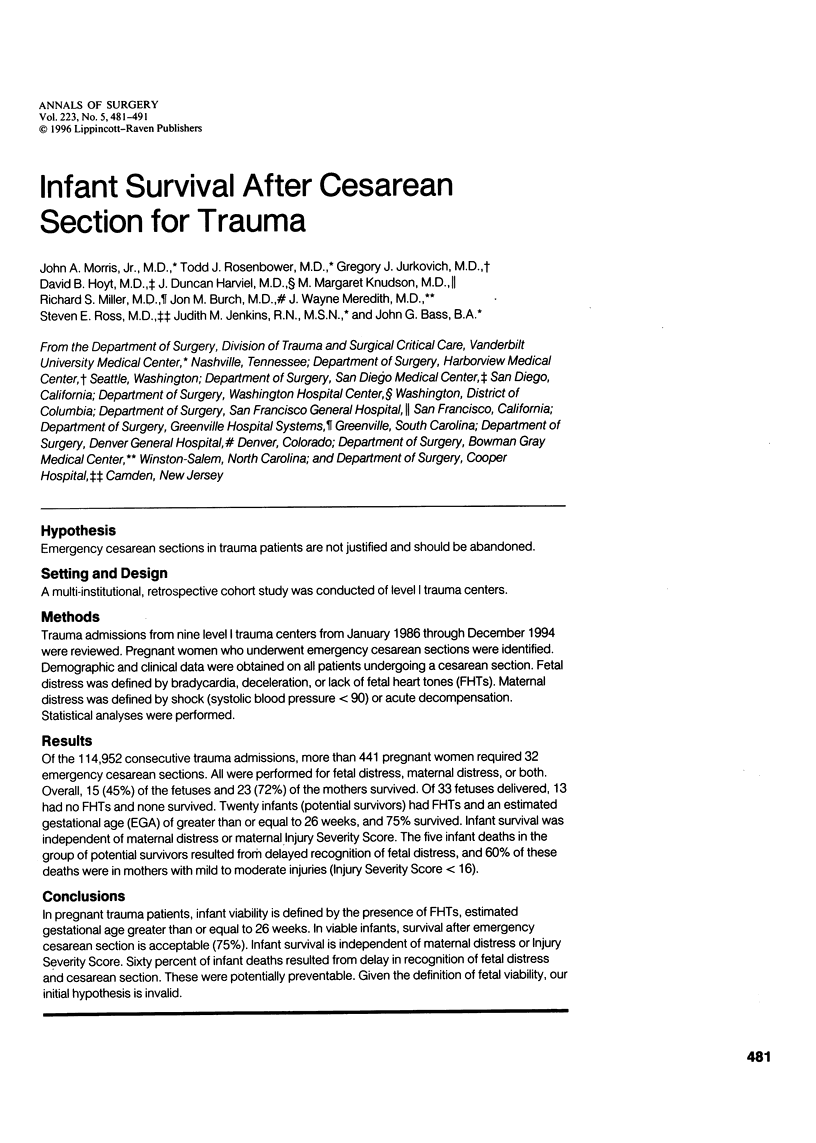
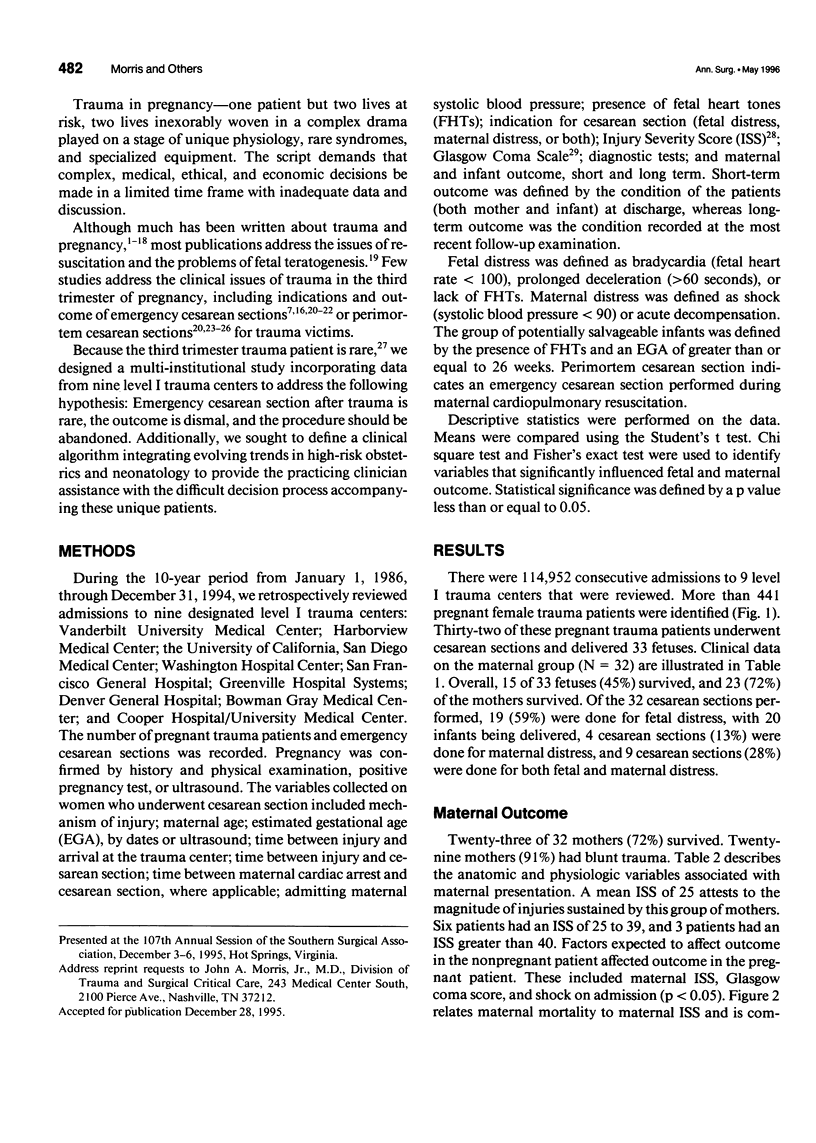
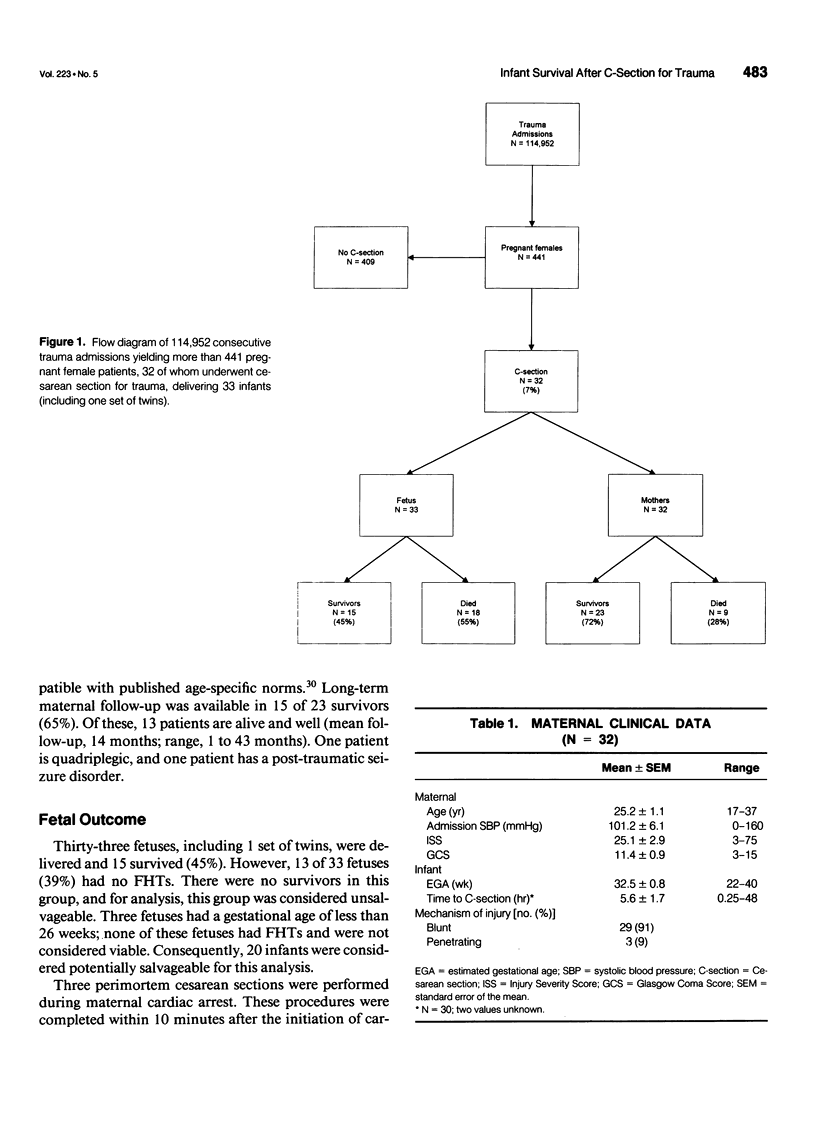
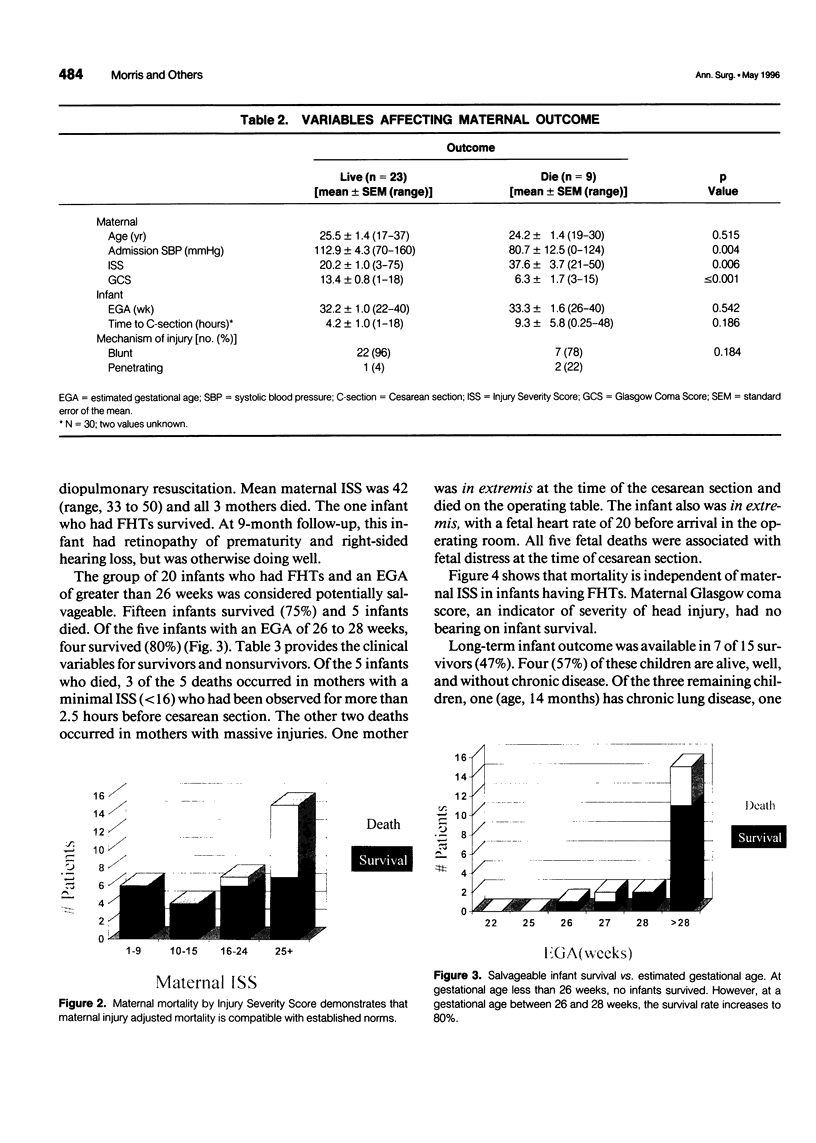
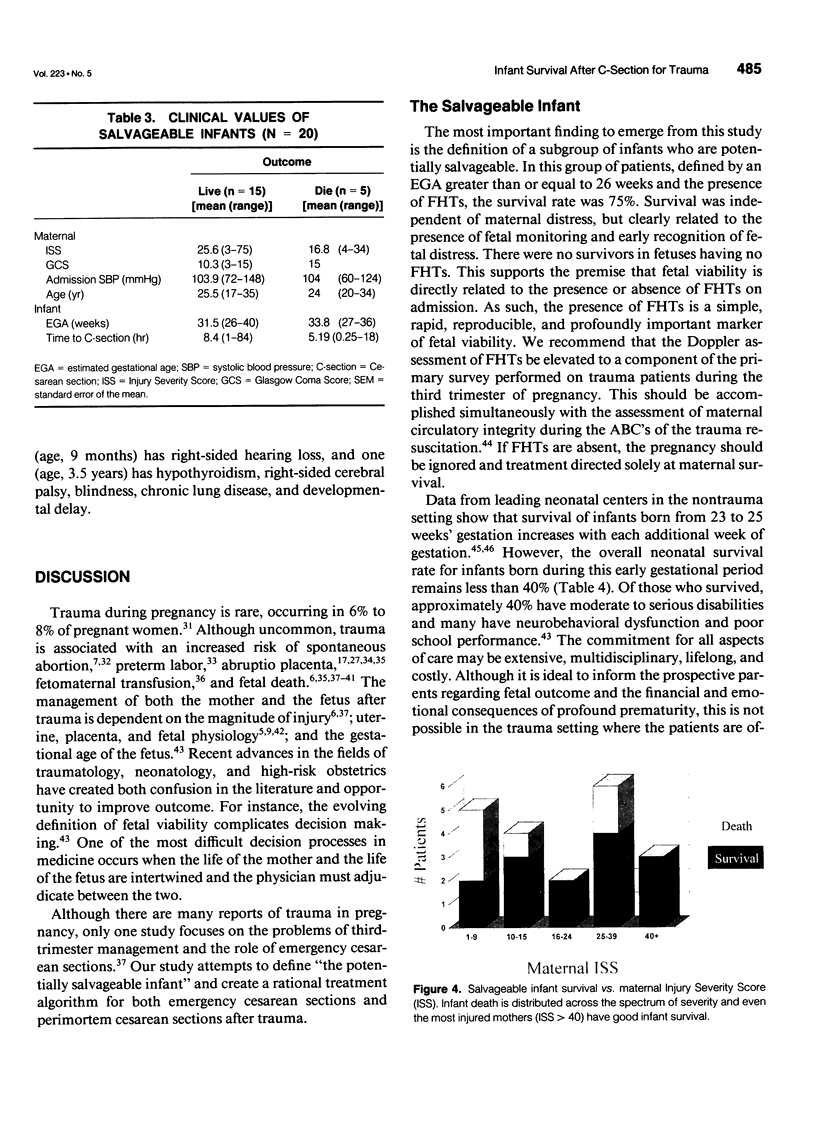
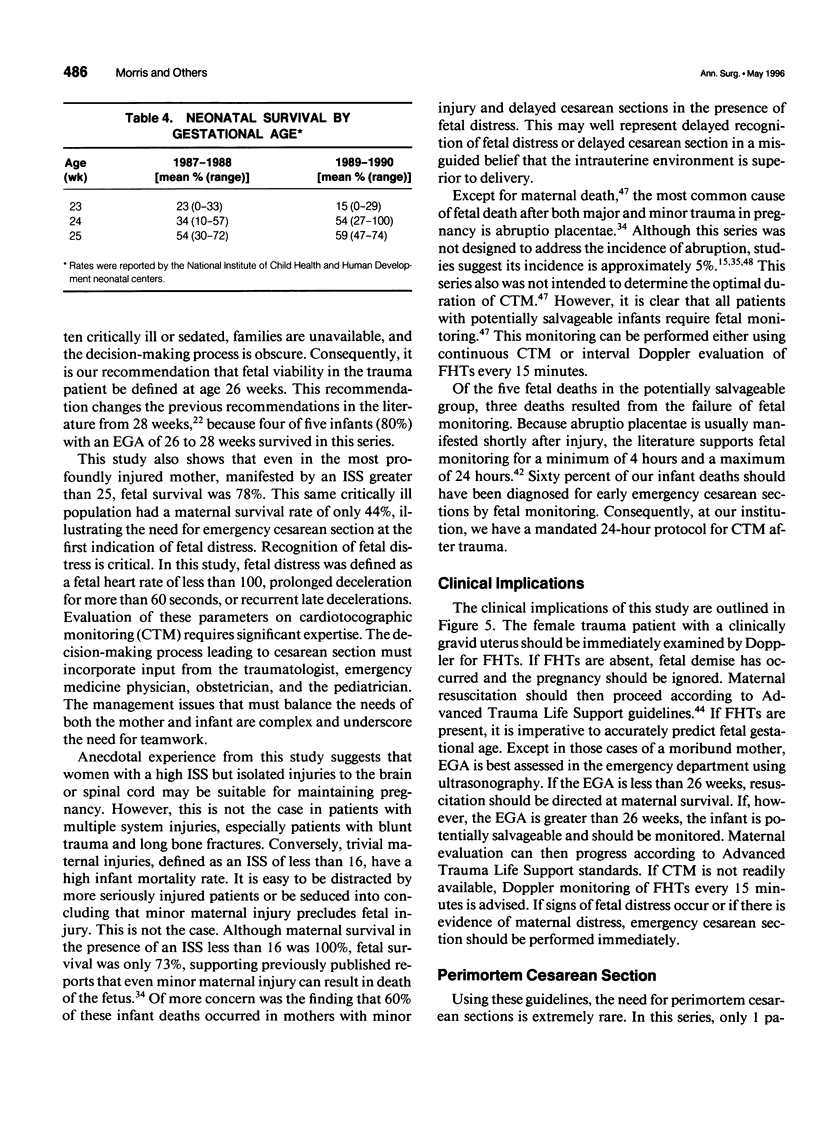
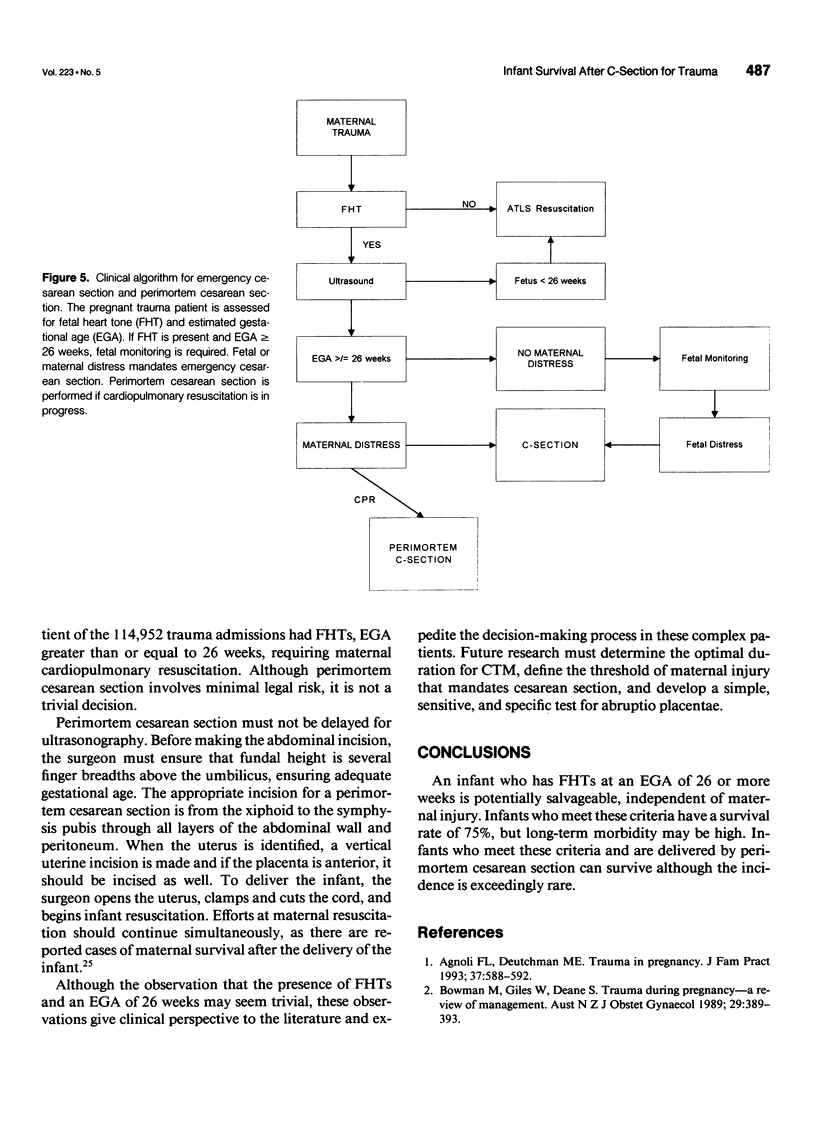
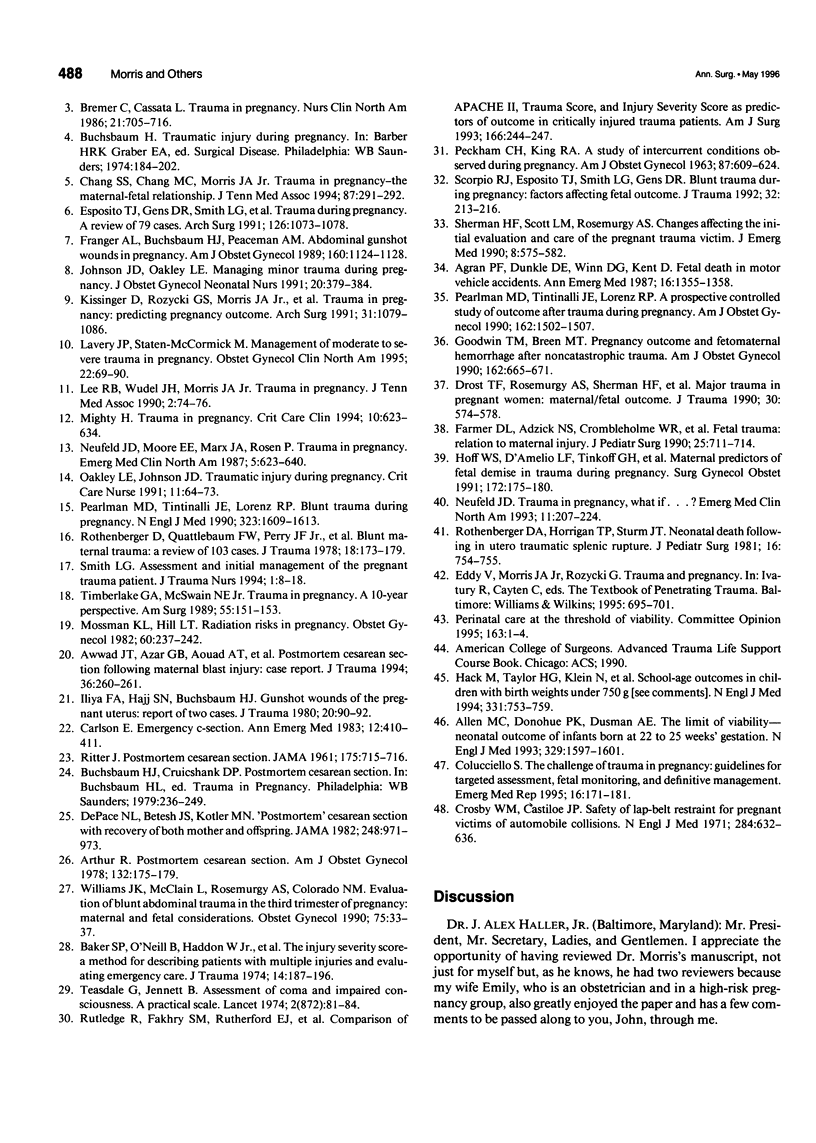
Images in this article
Selected References
These references are in PubMed. This may not be the complete list of references from this article.
- Agnoli F. L., Deutchman M. E. Trauma in pregnancy. J Fam Pract. 1993 Dec;37(6):588–592. [PubMed] [Google Scholar]
- Agran P. F., Dunkle D. E., Winn D. G., Kent D. Fetal death in motor vehicle accidents. Ann Emerg Med. 1987 Dec;16(12):1355–1358. doi: 10.1016/s0196-0644(87)80418-3. [DOI] [PubMed] [Google Scholar]
- Allen M. C., Donohue P. K., Dusman A. E. The limit of viability--neonatal outcome of infants born at 22 to 25 weeks' gestation. N Engl J Med. 1993 Nov 25;329(22):1597–1601. doi: 10.1056/NEJM199311253292201. [DOI] [PubMed] [Google Scholar]
- Arthur R. K. Postmortem cesarean section. Am J Obstet Gynecol. 1978 Sep 15;132(2):175–179. doi: 10.1016/0002-9378(78)90921-3. [DOI] [PubMed] [Google Scholar]
- Awwad J. T., Azar G. B., Aouad A. T., Raad J., Karam K. S. Postmortem cesarean section following maternal blast injury: case report. J Trauma. 1994 Feb;36(2):260–261. doi: 10.1097/00005373-199402000-00023. [DOI] [PubMed] [Google Scholar]
- Baker S. P., O'Neill B., Haddon W., Jr, Long W. B. The injury severity score: a method for describing patients with multiple injuries and evaluating emergency care. J Trauma. 1974 Mar;14(3):187–196. [PubMed] [Google Scholar]
- Bowman M., Giles W., Deane S. Trauma during pregnancy--a review of management. Aust N Z J Obstet Gynaecol. 1989 Nov;29(4):389–393. doi: 10.1111/j.1479-828x.1989.tb01775.x. [DOI] [PubMed] [Google Scholar]
- Bremer C., Cassata L. Trauma in pregnancy. Nurs Clin North Am. 1986 Dec;21(4):705–716. [PubMed] [Google Scholar]
- Carlson E. Emergency C-section. Ann Emerg Med. 1983 Jun;12(6):410–411. doi: 10.1016/s0196-0644(83)80501-0. [DOI] [PubMed] [Google Scholar]
- Chang S. S., Chang M. C., Morris J. A., Jr Trauma in pregnancy--the maternal-fetal relationship. J Tenn Med Assoc. 1994 Jul;87(7):291–292. [PubMed] [Google Scholar]
- Crosby W. M., Costiloe J. P. Safety of lap-belt restraint for pregnant victims of automobile collisions. N Engl J Med. 1971 Mar 25;284(12):632–636. doi: 10.1056/NEJM197103252841203. [DOI] [PubMed] [Google Scholar]
- DePace N. L., Betesh J. S., Kotler M. N. 'Postmortem' cesarean section with recovery of both mother and offspring. JAMA. 1982 Aug 27;248(8):971–973. [PubMed] [Google Scholar]
- Drost T. F., Rosemurgy A. S., Sherman H. F., Scott L. M., Williams J. K. Major trauma in pregnant women: maternal/fetal outcome. J Trauma. 1990 May;30(5):574–578. doi: 10.1097/00005373-199005000-00008. [DOI] [PubMed] [Google Scholar]
- Esposito T. J., Gens D. R., Smith L. G., Scorpio R., Buchman T. Trauma during pregnancy. A review of 79 cases. Arch Surg. 1991 Sep;126(9):1073–1078. doi: 10.1001/archsurg.1991.01410330027003. [DOI] [PubMed] [Google Scholar]
- Farmer D. L., Adzick N. S., Crombleholme W. R., Crombleholme T. M., Longaker M. T., Harrison M. R. Fetal trauma: relation to maternal injury. J Pediatr Surg. 1990 Jul;25(7):711–714. doi: 10.1016/s0022-3468(05)80002-8. [DOI] [PubMed] [Google Scholar]
- Franger A. L., Buchsbaum H. J., Peaceman A. M. Abdominal gunshot wounds in pregnancy. Am J Obstet Gynecol. 1989 May;160(5 Pt 1):1124–1128. doi: 10.1016/0002-9378(89)90173-7. [DOI] [PubMed] [Google Scholar]
- Goodwin T. M., Breen M. T. Pregnancy outcome and fetomaternal hemorrhage after noncatastrophic trauma. Am J Obstet Gynecol. 1990 Mar;162(3):665–671. doi: 10.1016/0002-9378(90)90979-h. [DOI] [PubMed] [Google Scholar]
- Hack M., Taylor H. G., Klein N., Eiben R., Schatschneider C., Mercuri-Minich N. School-age outcomes in children with birth weights under 750 g. N Engl J Med. 1994 Sep 22;331(12):753–759. doi: 10.1056/NEJM199409223311201. [DOI] [PubMed] [Google Scholar]
- Hoff W. S., D'Amelio L. F., Tinkoff G. H., Lucke J. F., Rhodes M., Diamond D. L., Indeck M., Smith J. S., Jr Maternal predictors of fetal demise in trauma during pregnancy. Surg Gynecol Obstet. 1991 Mar;172(3):175–180. [PubMed] [Google Scholar]
- Iliya F. A., Hajj S. N., Buchsbaum H. J. Gunshot wounds of the pregnant uterus: report of two cases. J Trauma. 1980 Jan;20(1):90–92. [PubMed] [Google Scholar]
- Johnson J. D., Oakley L. E. Managing minor trauma during pregnancy. J Obstet Gynecol Neonatal Nurs. 1991 Sep-Oct;20(5):379–384. [PubMed] [Google Scholar]
- Kissinger D. P., Rozycki G. S., Morris J. A., Jr, Knudson M. M., Copes W. S., Bass S. M., Yates H. K., Champion H. R. Trauma in pregnancy. Predicting pregnancy outcome. Arch Surg. 1991 Sep;126(9):1079–1086. doi: 10.1001/archsurg.1991.01410330033004. [DOI] [PubMed] [Google Scholar]
- Lavery J. P., Staten-McCormick M. Management of moderate to severe trauma in pregnancy. Obstet Gynecol Clin North Am. 1995 Mar;22(1):69–90. [PubMed] [Google Scholar]
- Lee R. B., Wudel J. H., Morris J. A., Jr Trauma in pregnancy. J Tenn Med Assoc. 1990 Feb;83(2):74–76. [PubMed] [Google Scholar]
- Mighty H. Trauma in pregnancy. Crit Care Clin. 1994 Jul;10(3):623–634. [PubMed] [Google Scholar]
- Mossman K. L., Hill L. T. Radiation risks in pregnancy. Obstet Gynecol. 1982 Aug;60(2):237–242. [PubMed] [Google Scholar]
- Neufeld J. D., Moore E. E., Marx J. A., Rosen P. Trauma in pregnancy. Emerg Med Clin North Am. 1987 Aug;5(3):623–640. [PubMed] [Google Scholar]
- Neufeld J. D. Trauma in pregnancy, what if ...? Emerg Med Clin North Am. 1993 Feb;11(1):207–224. [PubMed] [Google Scholar]
- Oakley L. E., Johnson J. D. Traumatic injury during pregnancy. Crit Care Nurse. 1991 Jun;11(6):64–73. [PubMed] [Google Scholar]
- PECKHAM C. H., KING R. W. A STUDY OF INTERCURRENT CONDITIONS OBSERVED DURING PREGNANCY. Am J Obstet Gynecol. 1963 Nov 1;87:609–624. doi: 10.1016/0002-9378(63)90055-3. [DOI] [PubMed] [Google Scholar]
- Pearlman M. D., Tintinalli J. E., Lorenz R. P. Blunt trauma during pregnancy. N Engl J Med. 1990 Dec 6;323(23):1609–1613. doi: 10.1056/NEJM199012063232307. [DOI] [PubMed] [Google Scholar]
- Pearlman M. D., Tintinallli J. E., Lorenz R. P. A prospective controlled study of outcome after trauma during pregnancy. Am J Obstet Gynecol. 1990 Jun;162(6):1502–1510. doi: 10.1016/0002-9378(90)90913-r. [DOI] [PubMed] [Google Scholar]
- RITTER J. W. Postmortem cesarean section. JAMA. 1961 Feb 25;175:715–716. doi: 10.1001/jama.1961.63040080021020d. [DOI] [PubMed] [Google Scholar]
- Rothenberger D. A., Horrigan T. P., Sturm J. T. Neonatal death following in utero traumatic splenic rupture. J Pediatr Surg. 1981 Oct;16(5):754–755. doi: 10.1016/s0022-3468(81)80573-8. [DOI] [PubMed] [Google Scholar]
- Rothenberger D., Quattlebaum F. W., Perry J. F., Jr, Zabel J., Fischer R. P. Blunt maternal trauma: a review of 103 cases. J Trauma. 1978 Mar;18(3):173–179. [PubMed] [Google Scholar]
- Scorpio R. J., Esposito T. J., Smith L. G., Gens D. R. Blunt trauma during pregnancy: factors affecting fetal outcome. J Trauma. 1992 Feb;32(2):213–216. [PubMed] [Google Scholar]
- Sherman H. F., Scott L. M., Rosemurgy A. S. Changes affecting the initial evaluation and care of the pregnant trauma victim. J Emerg Med. 1990 Sep-Oct;8(5):575–582. doi: 10.1016/0736-4679(90)90453-3. [DOI] [PubMed] [Google Scholar]
- Smith L. G. Assessment and initial management of the pregnant trauma patient. STNS J Trauma Nurs. 1994 Jul-Sep;1(1):8–20. [PubMed] [Google Scholar]
- Teasdale G., Jennett B. Assessment of coma and impaired consciousness. A practical scale. Lancet. 1974 Jul 13;2(7872):81–84. doi: 10.1016/s0140-6736(74)91639-0. [DOI] [PubMed] [Google Scholar]
- Timberlake G. A., McSwain N. E., Jr Trauma in pregnancy. A 10-year perspective. Am Surg. 1989 Mar;55(3):151–153. [PubMed] [Google Scholar]
- Williams J. K., McClain L., Rosemurgy A. S., Colorado N. M. Evaluation of blunt abdominal trauma in the third trimester of pregnancy: maternal and fetal considerations. Obstet Gynecol. 1990 Jan;75(1):33–37. [PubMed] [Google Scholar]





